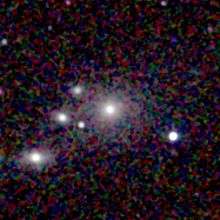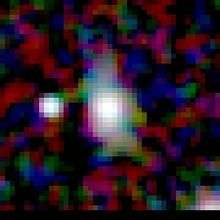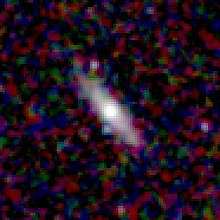NGC 7012
| NGC 7012 | |
|---|---|
 In this picture, NGC 7012 is surrounded by 3 smaller galaxies. The star TYC 7977-850-1 is also visible at the lower right. | |
| Observation data (J2000 epoch) | |
| Constellation | Microscopium |
| Right ascension | 21h 06m 45.5s[1] |
| Declination | −44° 48′ 53″[1] |
| Redshift | 0.029347/8798 km/s [1] |
| Distance | 381,654,000 ly |
| Apparent magnitude (V) | 13.65 [1] |
| Characteristics | |
| Type | E4 pec[1] |
| Apparent size (V) | 2.5 x 1.4[1] |
| Other designations | |
| ESO 286-51, AM 2103-450, PGC 66116 [1] | |
NGC 7012 is a large, bright[2] elliptical galaxy located about 381 million Light-years away from Earth in the constellation Microscopium[3][4] NGC 7012 was discovered by astronomer John Herschel on July 1, 1834.[5]
ACO S921
NGC 7012 is the brightest galaxy in the center of a small compact group of interacting galaxies[6] called ACO S921.[2] The cluster has about seven major galaxies with many other more distant, fainter galaxies that are probably also associated.[2]
NGC 7012
NGC 7012 Is the brightest galaxy in the cluster with an apparent magnitude of 12.6.[2]
J2106481-444853
J2106481-444853 is a very faint galaxy situated just 32" NE of NGC 7012 in a tight group of 5 galaxies. The galaxy is not listed in the NED, HyperLeda or SIMBAD databases.[2]
LCRS B210329.4-450104 [7]
| LCRS B210329.4-450104 | |
|---|---|
|
The galaxy LCRS B210329.4-450104. | |
| Observation data | |
| Constellation | Microscopium |
| Right ascension | 21h 06m 49.2s |
| Declination | −44° 49′ 00″ |
| Distance | 404 Mly |
LCRS B210329.4-450104 is another faint galaxy situated 40" E of the center of NGC 7012.[2]
ESO-LV 2860520[7]
| ESO-LV 2860520 | |
|---|---|
| Observation data | |
| Constellation | Microscopium |
| Right ascension | 21h 06m 50.8s |
| Declination | −44° 49′ 07″ |
| Redshift | 0.028953/8680 km/s |
| Distance | 372 Mly |
| Characteristics | |
| Type | E or S0 |
| Other designations | |
| PGC 66118, ESO 286-052 | |
This faint galaxy is located about 372 million light-years away from Earth.[2] ESO-LV 2860520 calculated velocity is 8680 km/s. The galaxy is either considered an Elliptical or a Lenticular.[8]
2MASX J21065660-4449137[9][10]
| 2MASX J21065660-4449137 | |
|---|---|
 Galaxy 2MASX J21065660-4449137. | |
| Observation data (J2000 epoch) | |
| Constellation | Microscopium |
| Right ascension | 21h 06m 56s |
| Declination | −44° 49′ 14″ |
| Distance | 404 Mly |
| Other designations | |
| PGC 533284[1] | |
2MASX J21065660-4449137 is a small, faint galaxy located near the core of ACO S921. It is situated 1.3" ESE of NGC 7012.[2]
ESO 286-048
| ESO 286-048 | |
|---|---|
 Lenticular galaxy ESO 286-048. | |
| Observation data (J2000 epoch) | |
| Constellation | Microscopium |
| Right ascension | 21h 06m 28.9s |
| Declination | −44° 47′ 20″ |
| Redshift | 0.030047/9008 km/s |
| Distance | 386 Mly |
| Characteristics | |
| Type | S0[11] |
| Size | ~158,761.54 ly |
| Other designations | |
| PGC 066109, ESO-LV2860480, 2MFGC15985, 2MASX J21062888-4447201. | |
ESO 286-048 is a faint lenticular galaxy located about 386 million light years away.[12] Viewed from Earth, the galaxy appears edge-on.[2] ESO 286-048's calculated velocity is 9008 km/s.[12][13] ESO 286-048 has an estimated diameter of 158,761 light-years.[12]
See also
External links
- NGC 7012 on WikiSky: DSS2, SDSS, GALEX, IRAS, Hydrogen α, X-Ray, Astrophoto, Sky Map, Articles and images
References
- 1 2 3 4 5 6 7 8 "NASA/IPAC Extragalactic Database". Results for NGC 7012. Retrieved 2017-05-13.
- 1 2 3 4 5 6 7 8 9 "NGC/IC Project Restoration Efforts". www.ngcicproject.org. Retrieved 2017-05-13.
- ↑ Rojas, Sebastián García. "Galaxy NGC 7012 Deep Sky Objects Browser". DSO Browser. Retrieved 2017-05-11.
- ↑ "Your NED Search Results". ned.ipac.caltech.edu. Retrieved 2017-05-13.
- ↑ "New General Catalog Objects: NGC 7000 - 7049". cseligman.com. Retrieved 2017-05-08.
- ↑ "ACO S 921". simbad.u-strasbg.fr. Retrieved 2017-05-18.
- 1 2 "HyperLeda -object description". leda.univ-lyon1.fr. Retrieved 2017-05-14.
- ↑ "Your NED Search Results". ned.ipac.caltech.edu. Retrieved 2017-05-14.
- ↑ "Your NED Search Results". ned.ipac.caltech.edu. Retrieved 2017-05-14.
- ↑ "HyperLeda -object description". leda.univ-lyon1.fr. Retrieved 2017-05-14.
- ↑ "NASA/IPAC Extragalactic Database". Results for ESO 286-048. Retrieved 2017-05-13.
- 1 2 3 "Your NED Search Results". ned.ipac.caltech.edu. Retrieved 2017-05-14.
- ↑ "HyperLeda -object description". leda.univ-lyon1.fr. Retrieved 2017-05-13.
